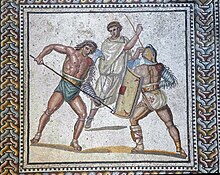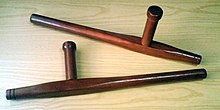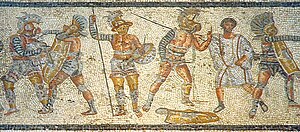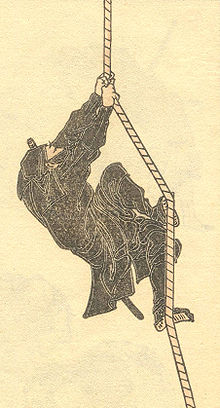The Martial Arts Portal

Martial arts are codified systems and traditions of combat practiced for a number of reasons such as self-defence; military and law enforcement applications; competition; physical, mental, and spiritual development; entertainment; and the preservation of a nation's intangible cultural heritage. (Full article...)
Although the earliest evidence of martial arts goes back millennia, the true roots are difficult to reconstruct. Inherent patterns of human aggression which inspire practice of mock combat (in particular wrestling) and optimization of serious close combat as cultural universals are doubtlessly inherited from the pre-human stage and were made into an "art" from the earliest emergence of that concept. Indeed, many universals of martial art are fixed by the specifics of human physiology and not dependent on a specific tradition or era.
Specific martial traditions become identifiable in Classical Antiquity, with disciplines such as shuai jiao, Greek wrestling or those described in the Indian epics or the Spring and Autumn Annals of China. (Full article...)
Selected articles
Selected biography
In his professional life, Kanō was an educator. Important postings included serving as director of primary education for the Ministry of Education (文部省, Monbushō) from 1898 to 1901, and as president of Tokyo Higher Normal School from 1900 until 1920. He was the educational founder of Nada High School in Kobe, Japan. He played a key role in making judo and kendo part of the Japanese public school programs of the 1910s. (Full article...)
Selected entertainment
The King of Fighters '94 (KOF '94) is a fighting game released by SNK for the Neo Geo MVS arcade system in 1994, as the first in The King of Fighters series. The game was also released for the Neo Geo home console systems, including the Neo Geo AES and Neo Geo CD. In 2008, KOF '94 was one of sixteen games included in SNK Arcade Classics Vol. 1 for the PlayStation 2, PlayStation Portable and Wii.
KOF '94 is a crossover featuring characters from SNK's fighting game properties Fatal Fury and Art of Fighting. It also includes revised versions of characters from their pre-Neo Geo games Ikari Warriors and Psycho Soldier, as well as original characters created specifically for the game. The plot features the creation of a new King of Fighters tournament created by the criminal Rugal Bernstein and is the only game to take place during the pre-Orochi Saga of the series.
SNK developed KOF '94 with the initial idea of using several games from the company in order to attract gamers who played these games. The characters' designs, as well as its innovative gameplay system based on using teams of three members, were both well received. The success of the game allowed SNK to produce a series of sequels in The King of Fighters series and the series itself eventually became the flagship series of SNK.
In 2004, to commemorate the tenth anniversary of the series, SNK released a remake titled The King of Fighters '94 Re-Bout. It features the original game and a new version with higher resolution graphics and 3D environments.
Sports portals
Selected image
 |
Senegalese wrestling (Njom in Serer, Lutte sénégalaise or simply Lutte avec frappe in French, Laamb in Wolof, Siɲɛta in Bambara) is a type of folk wrestling traditionally performed by the Serer people and now a national sport in Senegal and parts of The Gambia, and is part of a larger West African form of traditional wrestling (fr. Lutte Traditionnelle). The Senegalese form traditionally allows blows with the hands (frappe), the only one of the West African traditions to do so. As a larger confederation and championship around Lutte Traditionnelle has developed since the 1990s, Senegalese fighters now practice both forms, called officially Lutte Traditionnelle sans frappe (for the international version) and Lutte Traditionnelle avec frappe for the striking version. (Full article...)
General images -
Selected quote
Topics
- Regional origin - China - Europe - India - Indonesia - Japan - Korea - Philippines
- Unarmed techniques - Chokehold - Clinch - Footwork - Elbow strike - Headbutt - Hold - Kick - Knee strike - Joint lock - Punch - Sweep - Takedown - Throw
- Weapons - Archery - Duel - Knife fighting - Melee weapons - Shooting - Stick-fighting - Swordsmanship
- Training - Kata - Practice weapon - Punching bag - Pushing hands - Randori - Sparring
- Striking - Boxing - Capoeira - Karate - Kickboxing - Muay Thai - Lethwei - Sanshou - Savate - Taekwondo - Vovinam
- Internal - Aikido - Aikijutsu - Baguazhang - Tai chi - Xing Yi Quan
- Full contact / Combat sports - Professional boxing - Professional kickboxing - Knockdown karate - Mixed martial arts - Pankration - Submission wrestling
- Self-defense / Combatives - Arnis - Bartitsu - Hapkido - Kajukenbo - Krav Maga - MCMAP - Pencak Silat - Systema - Wing Chun - Legal aspects
- Eclectic / Hybrids - American Kenpo - Chun Kuk Do - Jeet Kune Do - Shooto - Shorinji Kempo - Unifight
Categories
Things you can do
See the list on the right of Martial art related projects who organise work on these articles. You can also add your self to the list of Wikipedians by martial art
Talk page tagging
If you come across a martial arts related article, adding the project template {{WikiProject Martial arts}} to the talk page will help identify them for improvement and linking to related articles. For Boxing, Fencing, Mixed martial arts and Sumo. Use {{WikiProject Boxing}}, {{WikiProject Fencing}}, {{WikiProject Mixed martial arts}} and {{WikiProject Sumo}} respectively.
- Assessment
- If possible please assess articles you tag using guidelines (Boxing, Mixed martial arts and Sumo).
Deletions
Monitor and contribute to deletion debates (Boxing).
Find images
Wikipedia requested images of martial artists, mixed martial artists and boxers.
Associated Wikimedia
The following Wikimedia Foundation sister projects provide more on this subject:
-
Commons
Free media repository -
Wikibooks
Free textbooks and manuals -
Wikidata
Free knowledge base -
Wikinews
Free-content news -
Wikiquote
Collection of quotations -
Wikisource
Free-content library -
Wikiversity
Free learning tools -
Wikivoyage
Free travel guide -
Wiktionary
Dictionary and thesaurus






















































































